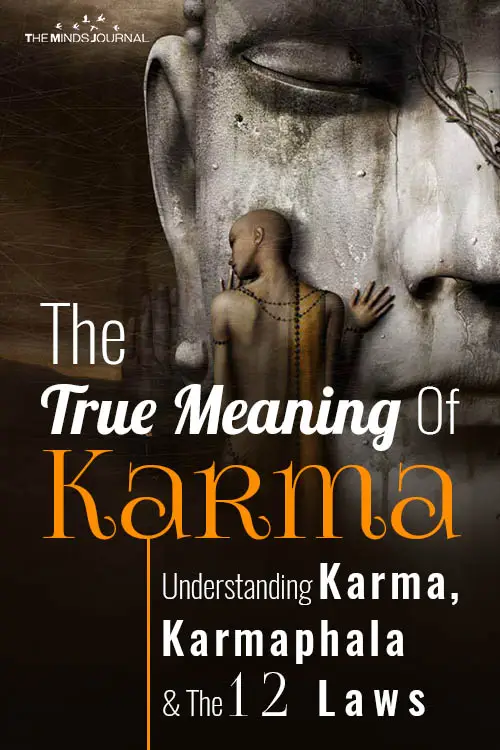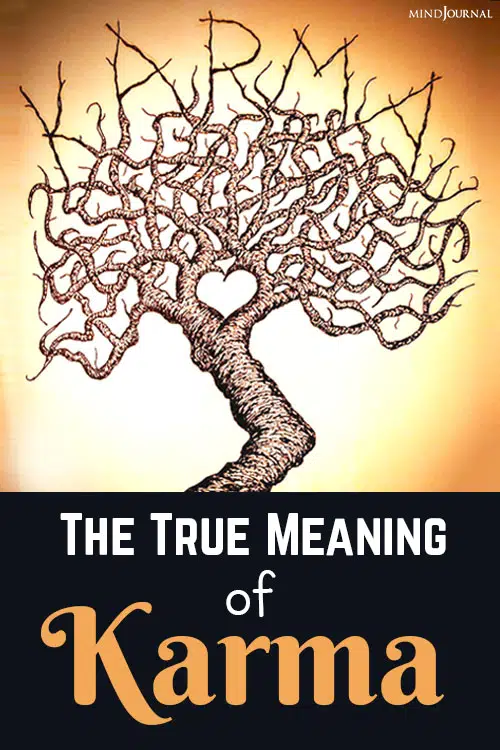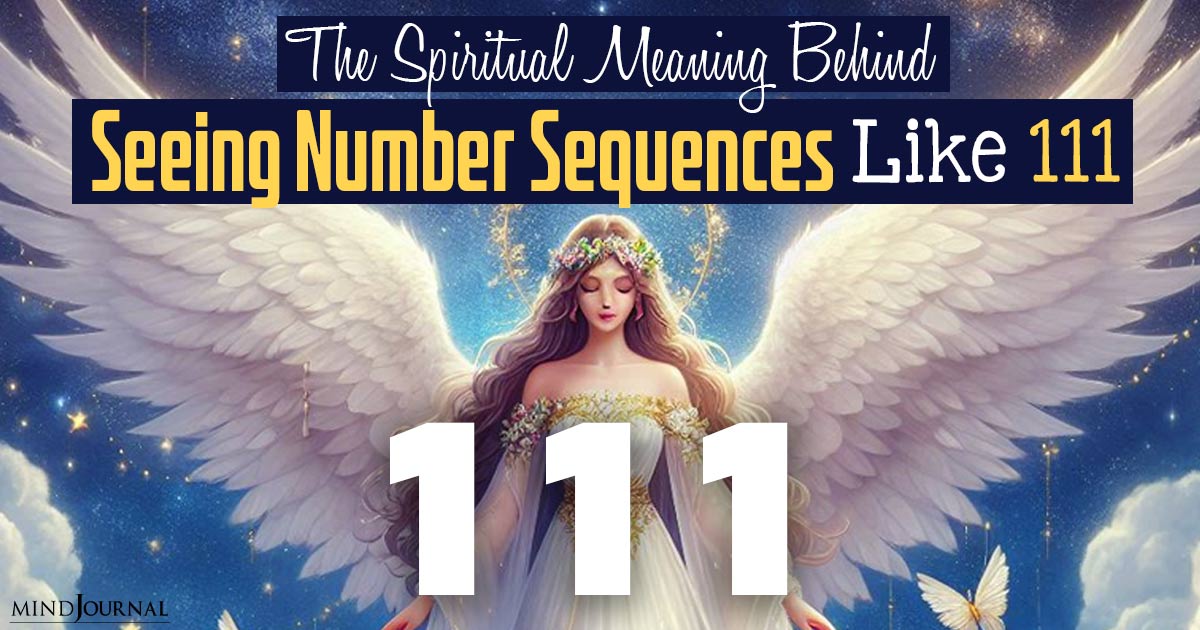Karma is a bitch. Or is it? Although the Buddhist concept of Karma is widely popular, most of us use the word ‘Karma’ very casually. Let’s take a look at the true meaning of karma and how it can help our spiritual development.
What is karma?
Karma is an ancient concept that was prevalent in various cultures, religions, and philosophies. According to Hinduism and Buddhism, the real meaning of karma is action. It refers to the actions of our mind, body, and spirit in every aspect and every moment of our life. Karma includes everything we do like our work, passions, charity, etc.

However, each of our actions leads to certain results, which may be positive or negative depending on our actions. According to ancient beliefs, we can experience the results of our actions either in the present life or after rebirth. Author Joseph Goldstein of the Tricycle: The Buddhist Review magazine, believes “The seeds of karma shape our lives and our worlds.” we can become aware of the delicate relationship between karma and our reality through mindfulness. In fact, spiritual awareness can enable us to alter our karma.{1}
Our actions determine our karma, especially the intentions and motives that drive such actions. When our actions are motivated by empathy, kindness, compassion, and altruism, aided by knowledge and mindfulness, it results in good karmic outcomes. It is a natural law and not an outside force, which many people falsely believe.
Related: 7 Things You Don’t Know About Karma
The true meaning of karma
To understand the real meaning of karma, we need to realize that it is not destiny or fate. Karma depends on your intentional actions and is not something related to ‘kismet’ or predestination. It is not about your fate or destiny. Contrary to popular belief, if you do a “bad” thing, it doesn’t necessarily mean that you will experience a negative consequence to maintain balance and harmony in the Universe. Your karma is determined by your thoughts and actions in each and every moment of life.
According to Zen Buddhism expert Barbara O’Brien “The word karma means action, not fate.” {2} Buddhists believe that karma is an energy that we create through deliberate thoughts, words, behaviors, and deeds. O’Brien explains that we create this spiritual force every moment which in turn affects every moment of our lives. It is not a result of a consequence, but simply an action. By changing our negative patterns, self-destructive habits, and intentional actions, we can steer our lives in a different direction.
Although karma is a law of the spiritual realm, it holds us responsible for our intentions and actions in our own reality. Karma is generated by the intention of our actions. “Actions and consequences are not the major concern though. It is the moral reason for the action. The law of karma is about moral intentions,” explains a 2008 study. {17} It is not about reward or punishment or retribution, but simply about reaping what we sow. Our thoughts and actions harvest our karma.

Related: 6 Ways You Can Create Good Karma Everyday
Karma and karmaphala
What most people believe to be the meaning of karma is actually the Buddhist concept of Karmaphala or the law of karma. In Buddhism, the metaphor of agriculture is widely used to explain the concept of Karma. It states that when you sow good or bad seeds (or actions), it will lead to good or bad fruit or phala.
To put it simply, karmaphala means the results of our actions. It is a Sanskrit term, where ‘karma’ means action or work, and ‘phala’ means consequence, fruit, or reward. Good or bad karma {3} results in good or bad karma phala.
Both karma and karmaphala are closely associated with the concept of reincarnation. These Buddhist philosophies show us how we are bound to the “wheel of life” by our actions. Your actions determine the quality of your resurrection in the “cycle of rebirth”, known as Samsara. Your karmaphala can be accumulated throughout your lifetime and even your past lives and may influence your current or future life.
The law of karma
Understanding the meaning of karma can help you understand the essence of the law of karma. It states that we are fully responsible for our intentions and actions. We are also responsible for anything that happens to us. The Hindu belief that good deeds result in a good life is based on this law.
“The law of karma is one of the most important laws governing our lives. When we understand it, and live our understanding, when we act on what we know, then we experience a sense of wholeness and peace. If we live in a way that is out of harmony, ignoring the nature of things, we then experience dissonance, pain, and confusion,” explains Joseph Goldstein.
The law of karma posits that we are the writers of our own lives and it is up to us how we fashion it. It is a law of nature and not a belief system. It is the simple law of cause and effect – every intentional act is followed by a specific outcome or consequence. Actions driven by wisdom, love, compassion, and altruism sow seeds of happiness and abundance, while actions motivated by hatred, greed, and selfishness lead to suffering and negative karmic conditions.
The 12 Laws of karma
There are 12 different laws of karma that affect our lives. Understanding these distinct laws can help us to enable us to create good karma and live a life of fulfillment and accomplishment.
Here are the 12 laws of karma that you need to know about:
1. The great law
This refers to the law of cause and effect. According to the great law, whatever you receive, whether negative or positive, is a result of whatever you give out to the universe. So if you want something to happen in your life, you need to embody that energy within yourself. Although it is considered an illusion by scientists, unrelated events often tend to share a causal connection. {4) So if you wish to live a happy life, filled with love and abundance, then become generous.
Related: The 5 Laws of Karma (and how they affect our life)
2. The law of creation
This law explains that if you want to receive what you wish for, then you need to actively pursue it. If you are currently unhappy with your life, then look inside and ask what you can do to change the situation. Instead of simply waiting for good things to happen to you, we must take decisive action. We must actively pursue our needs and wants and be in an environment that supports our actions.
3. The law of humility
The law of humility is a crucial aspect when trying to understand the meaning of karma and Buddhism. The rule dictates that you constantly reflect on yourself to bring about the necessary changes. According to this karmic law, we must learn to accept our reality as it is if we wish to truly change it for the better. “To be humble means to appreciate the limits of your abilities, understanding, and importance,” explains a 2010 study. {5}

4. The law of growth
If you want your circumstances to improve, then you need to start by improving yourself. As we can only control ourselves, we can change the world around us only by changing ourselves. So before you think about changing certain situations or people, you need to focus on personal development. This will provide you with better clarity and wisdom about what actually needs to change.
5. The law of responsibility
The law of karma states that you are responsible for what happens to you in your life. You are the source of your happiness and your sorrows. Hence, it is crucial that you take ownership of your actions and consequences, instead of blaming others.
6. The law of connection
According to this karmic rule, the past, present, and future are interconnected. Hence, the better we are able to control our present, the more capable we will become to create a better future. This will prevent negative experiences and energies from the past, whether in the existing life or a previous one, to affect our present and future.
Researcher Dr. Leonardo Cannizzaro of the Italian National Research Council explains “The past is the mother of the present and the grandmother of the future. The present is the child of the past and the father of the future. The future is a child of the present and a grandson of the past.” {6}
Related: 5 Reasons Why Smart People Don’t Take Revenge They Let KARMA Take Care Of It
7. The law of focus
This law states that if you want to succeed in life then it’s best to focus on a single goal and exclude other thoughts. The law of karma explains that the human mind is not designed to follow multiple goals or trains of thought with the same intensity and efficacy. Single-minded focus is the key to success. Moreover, when you focus on higher-value emotions, it will eliminate lower-value emotions like anger, envy, possessiveness.
8. The law of giving and hospitality
In Hinduism, the meaning of karma is closely associated with this law. It states that the universe often tests us in different ways. We are provided with opportunities at different stages in life to apply various life lessons and find out how much more we need to improve certain aspects and traits. It is about the connection between our beliefs and our actions. According to this law of karma, when we truly believe in something, then at some point in our lives our commitment to that belief will be tested. It emphasizes the association between belief and practice.
9. The law of here and now
Being mindful and accepting the truth of reality is one of the core beliefs in Buddhism. Hence, the meaning of karma is tied to the belief in mindfulness or living in the present moment. When we cling to the past and refuse to let go of past emotions, beliefs, experiences, and relationships, we force ourselves to live in the past. Similarly, when we think too much about the future, we end up being excessively stressed and anxious. The present moment is the only reality we have and so we should enjoy it fully. Studies reveal that being mindful can cause numerous positive psychological outcomes, like reduced stress, anxiety, depression, less emotional reactivity, better behavioral regulation and increased subjective well-being. {6}

10. The law of change
According to the Power of Positivity, the law of change refers to the belief that history tends to repeat itself in a particular path until you learn the lesson to bring about necessary positive changes. Conscious commitment is the key to change. However, you find yourself in a plateau, then it means that you have not paid enough attention or addressed something important. On the other hand, if you find your life is dramatically changing all of a sudden, then it is a result of your efforts for personal growth.
11. The law of patience and reward
If you wish to be rewarded, then you must be willing to work extremely hard and have patience. You cannot just wish for something and not put in the work necessary to accomplish it. It is only through incessant toil, persistence, and patience that we can claim our rewards. Moreover, your focus should be on the work that you do instead of the reward. The process is more important than the outcome. You will be rewarded when the time is right. Expecting instant results will only pave the way for disappointment. Being patient will help you achieve what you are truly capable of in the long run, while impatience will restrict you to minor accomplishments.
Related: 12 Laws of Karma (That Will Change Your Life)
12. The law of significance and inspiration
The law of significance and inspiration is perhaps the most inspiring law that helps you understand the true meaning of Karma. The law states that the worth and significance of something are directly determined by the intentions and energy invested in it. Your dedication, passion, and love form the intention behind something that results in a lasting impression and contribution to “the Whole.” This karmic law emphasizes that regardless of how major or minor our contributions to the world are, it will impact the Whole. Just like kindness and compassion from others make us kinder and more compassionate, our positive attitude will attract positive energy into our lives.
Understanding the meaning of karma
The essence of karma is our actions, thoughts, and words. Karma includes our actions conducted in the past, present, and future. Karma Phala or reward and punishment is the outcome of our deeds or karma. It reveals that we have the freedom and will to choose what occurs in our lives as it is influenced by our intentional thoughts, behaviors, and actions. This is where karma yoga comes in. According to a 2013 study, “Karma yoga is the path that leads to salvation through action.” Salvation is regarded as the ultimate state of consciousness and work is considered as “the central and defining characteristic of life”. {7}
Karma is not fate, rather it is closely tied to the cycle of cause and effect. As we are responsible for our karma, we are responsible for its consequences as well. Understanding karma and its laws can enlighten us so that we can navigate better through our lives. It also empowers us to take charge and be responsible for our present and future and fulfill our destiny.
Here is an interesting video that you may find helpful:












Leave a Reply
You must be logged in to post a comment.